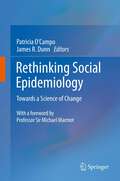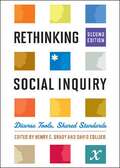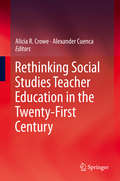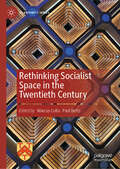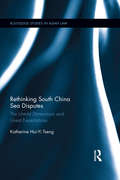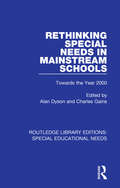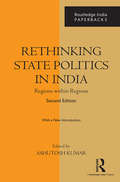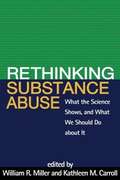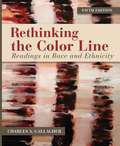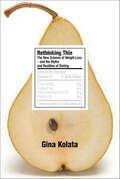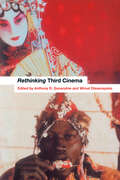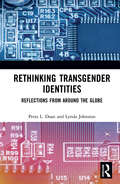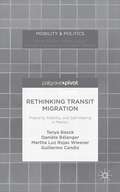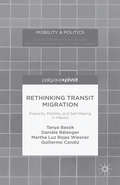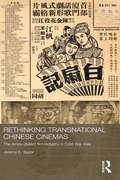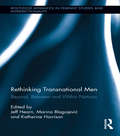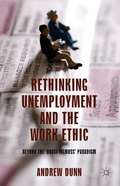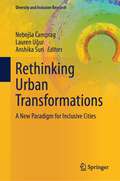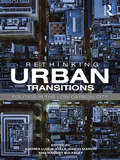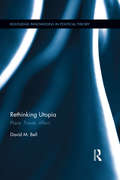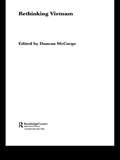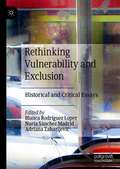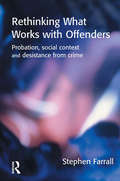- Table View
- List View
Rethinking Social Epidemiology
by James R. Dunn Patricia O’campoTo date, much of the empirical work in social epidemiology has demonstrated the existence of health inequalities along a number of axes of social differentiation. However, this research, in isolation, will not inform effective solutions to health inequalities. Rethinking Social Epidemiology provides an expanded vision of social epidemiology as a science of change, one that seeks to better address key questions related to both the causes of social inequalities in health (problem-focused research) as well as the implementation of interventions to alleviate conditions of marginalization and poverty (solution-focused research). This book is ideally suited for emerging and practicing social epidemiologists as well as graduate students and health professionals in related disciplines.
Rethinking Social Exclusion in India: Castes, Communities and the State (Routledge New Horizons in South Asian Studies)
by Minoru Mio and Abhijit DasguptaIn recent years exclusionary policies of the Indian state have raised questions concerning social harmony and economic progress. During the last few decades the emergence of identity politics has given new lease of life to exclusionary practices in the country. Castes, communities and ethnic groups have re-emerged in almost every sphere of social life. This book analyses different aspects of social exclusion in contemporary India. Divided into three sections – 1. New Forms of Inclusion and Exclusion in Contemporary India; 2. Religious Identities and Dalits; 3. Ethnicity and Politics of Inclusion and Exclusion in the North-eastern Frontier – the book shows that a shift has taken place in the discourse on inclusion and exclusion. Chapters by experts in their fields explore issues of inclusion and exclusion that merit special attention such as dalit identity, ethnicity, territoriality and minorities. Authors raise questions about developmental programmes of the state aimed at making India more inclusive and discuss development projects initiated to alleviate socio-economic conditions of the urban poor in the cities. As far as North-east region is concerned, the authors argue that there is a tendency to highlight the homogenizing nature of the Indian culture by stressing one history, one language, one social ethos. Diversity is hardly accepted as a social reality, which has adversely affected the inclusive nature of the state. Against this development the final part of the book looks at questions regarding ethnic minorities in the northeast. Offering new insights into the debate surrounding social exclusion in contemporary India, this book will be of interest to academics studying anthropology, sociology, politics and South Asian Studies.
Rethinking Social Inquiry: Diverse Tools, Shared Standards
by Henry E. Brady David CollierWith innovative new chapters on process tracing, regression analysis, and natural experiments, the second edition of Rethinking Social Inquiry further extends the reach of this path-breaking book. The original debate with King, Keohane, and Verba_now updated_remains central to the volume, and the new material illuminates evolving discussions of essential methodological tools. Thus, process tracing is often invoked as fundamental to qualitative analysis, but is rarely applied with precision. Pitfalls of regression analysis are sometimes noted, but often are inadequately examined. And the complex assumptions and trade-offs of natural experiments are poorly understood. The second edition extends the methodological horizon through exploring these critical tools. A distinctive feature of this edition is the online placement of four chapters from the prior edition, all focused on the dialogue with King, Keohane, and Verba.
Rethinking Social Studies Teacher Education in the Twenty-First Century
by Alicia R. Crowe Alexander CuencaIn this volume teacher educators explicitly and implicitly share their visions for the purposes, experiences, and commitments necessary for social studies teacher preparation in the twenty-first century. It is divided into six sections where authors reconsider: 1) purposes, 2) course curricula, 3) collaboration with on-campus partners, 4) field experiences, 5) community connections, and 6) research and the political nature of social studies teacher education. The chapters within each section provide critical insights for social studies researchers, teacher educators, and teacher education programs. Whether readers begin to question what are we teaching social studies teachers for, who should we collaborate with to advance teacher learning, or how should we engage in the politics of teacher education, this volume leads us to consider what ideas, structures, and connections are most worthwhile for social studies teacher education in the twenty-first century to pursue.
Rethinking Socialist Space in the Twentieth Century (St Antony's Series)
by Paul Betts Marcus CollaThis edited collection explores the problem of space under socialist regimes in the twentieth century. Bringing together contributions from international scholars with expertise in the architectural, urban, social, and cultural history of twentieth-century socialism, the book includes examples from China, Africa, Mongolia, Eastern Europe and the USSR. The volume reflects on how developments in the field over the past two decades have altered our understanding of how such spaces were constructed (both literally and discursively), how they could become sites of contested meanings, and how they were perceived outside the socialist world. Moreover, the volume is concerned with how scholarly approaches associated with post-colonialism, global history, gender history, and the ‘temporal’ and ‘sensory’ turns have reconfigured our knowledge of, and approach to, the history of socialist space.
Rethinking South China Sea Disputes: The Untold Dimensions and Great Expectations (Routledge Studies in Asian Law)
by Katherine Hui-Yi TsengThe proposed book draws on the on-going South China Sea dispute, and the multifaceted challenges wrought by the South China Sea issue that requires an inter-disciplinary perspective. It employs legal-analytical methods, to emphasize the nuances of the role and interpretation of international law and treaties by China in different periods, while taking into account policy and strategic concerns, which generally cast great sways in decision-making. The re-introduction of interdisciplinary concerns straddling law and history illustrates that the historical dimension, which has long been neglected, is an emerging concern that poses looming dangers that may unexpectedly radicalize the friction. Contributing to debunking the mystique wrought by confrontations between a historical and a law-dominated perspective, these perspectives are supported by a more nuanced analytical framework, featuring theoretical concerns with a tinge of practicality. The South China Sea Dispute aims to unveil a nuanced evolution of the issue with a confluence of inter-temporal law, policy and maritime practices in the South China Sea.
Rethinking Special Needs in Mainstream Schools: Towards the Year 2000 (Routledge Library Editions: Special Educational Needs #16)
by Alan Dyson Charles GainsFirst published in 1993. This book critically analyses the state of provision for special needs, exploring the problems faced by practitioners and suggesting that the area is fraught with such tensions that a radical reconceptualization is necessary. It considers how the field may be rethought and developed over the next decade and presents examples of innovatory practice which point the way forward to future provision and which are illustrative of the themes raised throughout the book.
Rethinking State Politics in India: Regions within Regions
by Ashutosh KumarIn recent decades, India has been witness to the assertion of geographically, culturally and historically constituted distinct and well-defined regions that display ethnic, communal, caste and other social–political cleavages. This book examines the changing configurations of state politics in India. Focussing on identity politics and development, it explores the specificities of the regions within states — not merely as politico-administrative constructs but also as conceived in historical, geographic, economic, sociological or cultural terms. Adopting a comparative approach, the book looks at alternative theoretical approaches — the quest for homeland, identity, caste politics and public policy. This second edition includes a new Introduction that updates the research in the area, while further developing the theoretical framework. One of the first major volumes on federalism in India, including studies from across the nation, this book will be indispensable for students and scholars of political science, sociology, history and South Asian studies.
Rethinking Substance Abuse
by William MillerWhile knowledge on substance abuse and addictions is expanding rapidly, clinical practice still lags behind. This state-of-the-art book brings together leading experts to describe what treatment and prevention would look like if it were based on the best science available. The volume incorporates developmental, neurobiological, genetic, behavioral, and social-environmental perspectives. Tightly edited chapters summarize current thinking on the nature and causes of alcohol and other drug problems; discuss what works at the individual, family, and societal levels; and offer robust principles for developing more effective treatments and services.
Rethinking The Color Line: Readings In Race And Ethnicity
by Charles A. Gallagher<P>User-friendly without sacrificing intellectual or theoretical rigor, this anthology of current research examines contemporary issues and explores new approaches to the study of race and ethnic relations. <P>The featured readings effectively engage students by helping them understand theories and concepts. <P>Active learning in the classroom is encouraged while providing relevance for students from all ethnic, cultural, and economic backgrounds. The fifth edition features ten new articles on such timely topics as: <P> • The U.S. Census’ changing definition of race and ethnicity • Race-based disparities in health • Racial and gender discrimination among racial minorities and women • Being Arab and American • How social control maintains racial inequality • The increase in black and brown incarceration • How racial bias may affect the use of DNA to locate suspects of crimes • How derogatory ethnic and racial images are created and disseminated by the media • The sexualization of African American women through the use of gender stereotypes • The portrayal of light- and dark-skinned biracial characters
Rethinking The Subject: An Anthology Of Contemporary European Social Thought
by James FaubionSince the early 1970s, European thinkers have departed notably from their predecessors in order to pursue analytical programs more thoroughly their own. Rethinking the Subject brings together in one volume some of the most influential writings of Foucault, Habermas, Bourdieu, Pizzorno, Macfarlane, and other authors whose ideas have had a worldwide influence in recent social history.The anthology is testament to the central importance of three contemporary themes, each familiar to earlier thinkers but never definitively formulated or resolved. The first two concern the nature and modalities of power and legitimacy in society. The third, and most fundamental, deals with the nature and modalities of the ?self? or ?subject.?These themes owe their special contemporary relevance to an array of events?from the collapse of colonialism to the birth of test-tube babies. James Faubion's introduction traces the historical context of these influential events and themes. It also traces the lineaments of a still inchoate intellectual movement, of which the writers included in this anthology are the vanguard.
Rethinking Thin: The New Science of Weight Loss—and the Myths and Realities of Dieting
by Gina KolataIn this eye-opening book, New York Times science writer Gina Kolata shows that our society's obsession with dieting and weight loss is less about keeping trim and staying healthy than about money, power, trends, and impossible ideals.Rethinking Thin is at once an account of the place of diets in American society and a provocative critique of the weight-loss industry. Kolata's account of four determined dieters' progress through a study comparing the Atkins diet to a conventional low-calorie one becomes a broad tale of science and society, of social mores and social sanctions, and of politics and power.Rethinking Thin asks whether words like willpower are really applicable when it comes to eating and body weight. It dramatizes what it feels like to spend a lifetime struggling with one's weight and fantasizing about finally, at long last, getting thin. It tells the little-known story of the science of obesity and the history of diets and dieting—scientific and social phenomena that made some people rich and thin and left others fat and miserable. And it offers commonsense answers to questions about weight, eating habits, and obesity—giving us a better understanding of the weight that is right for our bodies.
Rethinking Third Cinema: The Role Of Anti-colonial Media And Aesthetics In Postmodernity (Kultur: Forschung Und Wissenschaft Ser. #13)
by Wimal Dissanayake Anthony R. GuneratneThis important anthology addresses established notions about Third Cinema theory, and the cinema practice of developing and postcolonial nations. The 'Third Cinema' movement called for a politicised film-making practice in Africa, Asia and Latin America, one which would take on board issues of race, class, religion, and national integrity. The films which resulted from the movement, from directors such as Ousmane Sembene, Satyajit Ray and Nelson Pereira dos Santos, are among the most culturally signficant, politically sophisticated and frequently studied films of the 1960s and 1970s. However, despite the contemporary popularity and critical attention enjoyed by films from Asia and Latin America in particular, Third Cinema and Third Cinema theory appears to have lost its momentum.Rethinking Third Cinema seeks to bring Third Cinema and Third Cinema theory back into the critical spotlight. The contributors address the most difficult and challenging questions Third Cinema poses, suggesting new methodologies and redirections of existing ones. Crucially, they also re-examine the entire phenomenon of film-making in a fast-vanishing 'Third World', with case studies of the cinemas of India, Iran and Hong Kong, among others.
Rethinking Transgender Identities: Reflections from Around the Globe
by Petra L. Doan Lynda JohnstonThis volume explores the diversity and complexity of transgender people’s experiences and demonstrates that gendered bodies are constructed through different social, cultural and economic networks and through different spaces and places. Rethinking Transgender Identities brings together original research in the form of interviews, participatory methods, surveys, cultural texts and insightful commentary. The contributing scholars and activists are located in Aotearoa New Zealand, Brazil, Canada, Catalan, China, Japan, Scotland, Spain, and the United States. The collection explores the relationship between transgender identities and politics, lived realities, strategies, mobilizations, age, ethnicity, activisms and communities across different spatial scales and times. Taken together, the chapters extend current research and provide an uthoritative state-of-the-art review of current research, which will appeal to cholars and graduate students working within the fields of sociology, gender studies, sexuality and queer studies, family studies, media and cultural studies, psychology, health, law, criminology, politics and human geography.
Rethinking Transit Migration: Precarity, Mobility, And Self-Making in Mexico (Mobility & Politics)
by Danièle Bélanger Tanya Basok Martha Luz Rojas Wiesner Guillermo CandizRethinking Transit Migration.
Rethinking Transit Migration: Precarity, Mobility, and Self-Making in Mexico (Mobility & Politics)
by Danièle Bélanger Tanya Basok Guillermo Candiz Martha Luz Rojas WiesnerQuestioning the notion of transit migration, the book examines factors that shape Central American migrants' mobility and immobility in the transnational space, comprised on Central American countries, Mexico, and the US.
Rethinking Transnational Chinese Cinemas: The Amoy-Dialect Film Industry in Cold War Asia (Media, Culture And Social Change In Asia Ser.)
by Jeremy E. TaylorThe Amoy-dialect film industry emerged in the 1950s, producing cheap, b-grade films in Hong Kong for direct export to the theatres of Manila Chinatown, southern Taiwan and Singapore. Films made in Amoy dialect - a dialect of Chinese - reflected a particular period in the history of the Chinese diaspora, and have been little studied due to their ambiguous place within the wider realm of Chinese and East Asian film history. This book represents the first full length, critical study of the origin, significant rise and rapid decline of the Amoy-dialect film industry. Rather than examining the industry for its own sake, however, this book focuses on its broader cultural, political and economic significance in the region. It questions many of the assumptions currently made about the ‘recentness’ of transnationalism in Chinese cultural production, particularly when addressing Chinese cinema in the Cold War years, as well as the prominence given to ‘the nation’ and ‘transnationalism’ in studies of Chinese cinemas and of the Chinese Diaspora. By examining a cinema that did not fit many of the scholarly models of ‘transnationalism’, that was not grounded in any particular national tradition of filmmaking and that was largely unconcerned with ‘nation-building’ in post-war Southeast Asia, this book challenges the ways in which the history of Chinese cinemas has been studied in the recent past.
Rethinking Transnational Men: Beyond, Between and Within Nations (Routledge Advances in Feminist Studies and Intersectionality #12)
by Jeff Hearn Katherine Harrison Marina BlagojevićThe world is becoming more transnational. This edited collection examines how the immense transnational changes in the contemporary world are being produced by and are affecting different men and masculinities. It seeks to shift debates on men, masculinities and gender relations from the strictly local and national context to much greater concern with the transnational and global. Established and rising scholars from Asia, Australia, Europe and North America explore subjects including economies and business corporations; sexualities and the sex trade; information and communication technologies and cyberspace; migration; war, the military and militarism; politics; nationalism; and symbolism and image-making.
Rethinking Unemployment and the Work Ethic
by Andrew DunnWhile recent Labour and coalition governments have insisted that many unemployed people prefer state benefits to a job, and have tightened the rules attached to claiming unemployment benefits, mainstream academic research repeatedly concludes that only a tiny minority of unemployed benefit claimants are not strongly committed to employment. Andrew Dunn argues that the discrepancy can be explained by UK social policy academia leaving important questions unanswered. Dunn presents findings from four empirical studies which, in contrast to earlier research, focused on unemployed people's attitudes towards unattractive jobs and included interviews with people in welfare-to-work organisations. All four studies' findings were consistent with the view that many unemployed benefit claimants prefer living on benefits to undertaking jobs which would increase their income, but which they find unattractive. Thus, the studies gave support to politicians' view about the need to tighten benefit rules.
Rethinking Urban Transformations: A New Paradigm for Inclusive Cities (Diversity and Inclusion Research)
by Nebojša Čamprag Lauren Uğur Anshika SuriThis edited volume delves into the intricate challenges that cities face in the midst of evolving socio-political, economic, and environmental landscapes. With a focus on inclusivity and diversity, the book thoroughly examines the transformation of urban systems and their manifestations within broader spatial contexts. Employing a trans- and interdisciplinary approach, the editors have strategically curated diverse research clusters to address key aspects of inclusive urban transformation from multiple perspectives. These clusters explore alternative paradigms for sustainable urban transformation, the dynamics of city regions, inclusive tourism development, the de-contestation of urban heritage to diversify urban identities, and inclusive intersectional city-making practices. By fostering collaboration and cross-pollination among these clusters, the volume fosters a transdisciplinary understanding of inclusive and sustainable urban transformation, facilitating the development of more holistic approaches in conceptualizing and promoting inclusive urban theory and praxis.
Rethinking Urban Transitions: Politics in the Low Carbon City
by Harriet Bulkeley Simon Marvin Andrés Luque-AyalaRethinking Urban Transitions provides critical insight for societal and policy debates about the potential and limits of low carbon urbanism. It draws on over a decade of international research, undertaken by scholars across multiple disciplines concerned with analysing and shaping urban sustainability transitions. It seeks to open up the possibility of a new generation of urban low carbon transition research, which foregrounds the importance of political, geographical and developmental context in shaping the possibilities for a low carbon urban future. The book’s contributions propose an interpretation of urban low carbon transitions as primarily social, political and developmental processes. Rather than being primarily technical efforts aimed at measuring and mitigating greenhouse gases, the low carbon transition requires a shift in the mode and politics of urban development. The book argues that moving towards this model requires rethinking what it means to design, practise and mobilize low carbon in the city, while also acknowledging the presence of multiple and contested developmental pathways. Key to this shift is thinking about transitions, not solely as technical, infrastructural or systemic shifts, but also as a way of thinking about collective futures, societal development and governing modes – a recognition of the political and contested nature of low carbon urbanism. The various contributions provide novel conceptual frameworks as well as empirically rich cases through which we can begin to interrogate the relevance of socio-economic, political and developmental dimensions in the making or unmaking of low carbon in the city. The book draws on a diverse range of examples (including ‘world cities’ and ‘ordinary cities’) from North America, South America, Europe, Australia, Africa, India and China, to provide evidence that expectations, aspirations and plans to undertake purposive socio-technical transitions are both emerging and encountering resistance in different urban contexts. Rethinking Urban Transitions is an essential text for courses concerned with cities, climate change and environmental issues in sociology, politics, urban studies, planning, environmental studies, geography and the built environment.
Rethinking Utopia: Place, Power, Affect (Routledge Innovations in Political Theory)
by David M. BellOver five hundred years since it was named, utopia remains a vital concept for understanding and challenging the world(s) we inhabit, even in – or rather because of – the condition of ‘post-utopianism’ that supposedly permeates them. In Rethinking Utopia David M. Bell offers a diagnosis of the present through the lens of utopia and then, by rethinking the concept through engagement with utopian studies, a variety of ‘radical’ theories and the need for decolonizing praxis, shows how utopianism might work within, against and beyond that which exists in order to provide us with hope for a better future. He proposes paying a ‘subversive fidelity’ to utopia, in which its three constituent terms: ‘good’ (eu), ‘place’ (topos), and ‘no’ (ou) are rethought to assert the importance of immanent, affective relations. The volume engages with a variety of practices and forms to articulate such a utopianism, including popular education/critical pedagogy; musical improvisation; and utopian literature. The problems as well as the possibilities of this utopianism are explored, although the problems are often revealed to be possibilities, provided they are subject to material challenge. Rethinking Utopia offers a way of thinking about (and perhaps realising) utopia that helps overcome some of the binary oppositions structuring much thinking about the topic. It allows utopia to be thought in terms of place and process; affirmation and negation; and the real and the not-yet. It engages with the spatial and affective turns in the social sciences without ever uncritically being subsumed by them; and seeks to make connections to indigenous cosmologies. It is a cautious, careful, critical work punctuated by both pessimism and hope; and a refusal to accept the finality of this or any world.
Rethinking Vietnam (Rethinking Southeast Asia)
by Duncan McCargoA uniquely comprehensive overview of a fascinating and rapidly changing country, dealing with the politics, economics, society and foreign policy of Vietnam from the Doi Moi reforms of market socialism in 1986 to the present day. Drawing on fieldwork and analysis by an international team of specialists this book covers all aspects of contemporary Vietnam including recent history, the political economy, the reform process, education, health, labour market, foreign direct investment and foreign policy. The contributors show how the blurring of old and new pressures and traditions within Vietnam requires a more complex analysis of the country than might initially be assumed.
Rethinking Vulnerability and Exclusion: Historical and Critical Essays
by Blanca Rodríguez Lopez Nuria Sánchez Madrid Adriana ZaharijevićThis volume offers novel and provocative insights into vulnerability and exclusion, two concepts crucial for the understanding of contemporary political agency. In twelve critical essays, the contributors explore the dense theoretical content, complex histories and conceptual intersection of vulnerability and exclusion. A rich array of topics are covered as the volume searches for the ways that vulnerable and excluded groups relate to each other, where the boundary between the excluded and the included arises, and what the stakes of ‘invulnerability’ might be. Drawing on the works of Hegel (via Judith Butler), Helmuth Plessner and Hannah Arendt to situate the project in a solid historical context, the volume likewise tackles pressing and contemporary issues such as the state of human capital under neoliberalism, the flawed nature of democracy itself, and the vulnerability inherent in extreme precarity, extreme violence, and interdependence. The contributions come from philosophers with a range of backgrounds in social philosophy and critical social sciences, who use related conceptual tools to tackle the political challenges of the 21st century. Together, they present a ground-breaking overview of the main challenges which social exclusion presents to contemporary global societies.
Rethinking What Works with Offenders: Probation, Social Context And Desistance From Crime (International Series On Desistance And Rehabilitation Ser.)
by Stephen FarrallThis important and original new book reports on a major investigation of the outcomes of probation supervision, is concerned with the key question of what works in probation, and comes at an important moment of change and development for the probation service in the UK. Unlike previous studies which have relied mostly on official data, this book makes use of over 200 interviews with men and women on probation, and their supervising Probation Officers. Rethinking What Works with Offenders has the following objectives: to understand probation work from the perspectives of those who deliver it and those to whom it is delivered to study probation intervention as a whole (in particular the probation order) rather than specific aspects to locate probation work in the wider social contexts of those on probation to analyse how probation works, and to reconceptualise probation outcomes in terms of degrees of success rather than as 'successful' or 'unsuccessful' to assess the policy implications of these conclusions This book presents an important and challenging range of findings on 'what works' in probation and with offenders, and will be essential reading for anybody professionally concerned with the present and future of probation. raises central issues at a critical time for the reorganised National Probation Servicebased on extensive research, including 200+ interviewsessential reading for anybody interested in 'what works' in probation
